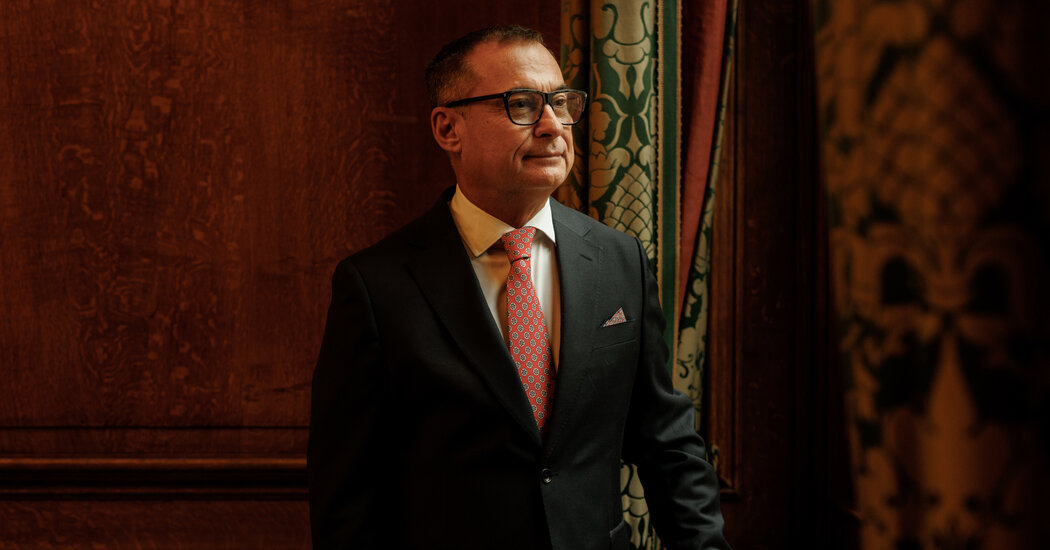Central bank chiefs are cautious by nature, mindful that their words can move markets and influence politics.
But Joachim Nagel, the president of the Bundesbank, the central bank of Germany, has recently become more outspoken about the challenges facing Europe’s largest economy, the policies he thinks lawmakers should adopt and the importance of defending institutions like his from criticism.
“When you are in a hurricane, you have this quiet in the eye of the storm,” he said in an interview in London with The New York Times. This may describe the European economy today, he added.
President Trump’s tariffs and wavering commitment to Ukraine in its war with Russia have shaken Europe’s capitals. They appeared to galvanize leaders to bolster economic ties within the continent and spend more on defense. Some also saw a chance for the euro to establish itself as a haven for investors backed by a market of 350 million people.
Even as the European Union and the United States have agreed on the outline of a trade deal, taking the sting out of some of the tariffs, a sense of urgency should be maintained, Mr. Nagel said. Europe faces daunting debts, pressure on government budgets and “uncertain political situations,” he said.
The German economy shrank in 2023 and 2024, with exports no longer serving as a reliable growth engine. At the same time, France, the European Union’s second-largest economy, is stuck in a political quagmire, struggling to manage its fragile finances.
“Complacency is definitely not the right attitude,” Mr. Nagel said. The answer, for him, is greater European integration, and he warned against underestimating the region’s ability to adapt to its challenges.
On Slow Growth and Threats to Democracy
As unelected officials, central bankers tend to be very careful about wading into policy debates.
Mr. Nagel said he had become more forthright, and the turning point was in early 2024 when he attended a demonstration for the first time. Around that time, pro-democracy demonstrations attracted tens of thousands of people, after news spread that the far-right party Alternative for Germany had held a secret meeting to discuss plans for the mass deportation of immigrants and some German citizens with immigrant backgrounds.
“I was really embarrassed during that time,” Mr. Nagel said. Even as an independent central banker who is meant to stay out of politics, he said, he felt a “responsibility” to stand up for democracy, freedom of speech and the institutions that had been developed since the end of the Second World War.
In recent speeches, Mr. Nagel has pushed for the policies he says Germany needs to urgently adopt, including cutting red tape, increasing the supply of workers, investing in technology and lowering energy prices.
Germany’s government unveiled a plan this summer to borrow more than 100 billion euros ($116 billion) this year to spend, including on the military and infrastructure. The economy ministry said this week that it expected economic growth of just 0.2 percent this year, with government spending helping to spur more growth starting next year.
But citizens are impatient for results, and “we have to speed up,” Mr. Nagel said.
On Interest Rates and Central Bank Independence
It helps that Mr. Nagel’s primary mandate as a central banker — ensuring price stability — appears to have been achieved. Inflation in the eurozone is close to the European Central Bank’s 2 percent target, and many policymakers, including Mr. Nagel, seem relaxed about forecasts that inflation could drift below this target in the next two years.
“The bar is rather high,” he said, to alter his assessment that the current monetary policy stance is appropriate. The European Central Bank, which sets interest rates for the 20 nations that use the euro and is based in Frankfurt, has held its key rate at 2 percent since June. Before that, it cut rates at eight consecutive meetings.
Mr. Nagel said he was not concerned about the strength in the euro, which makes imports cheaper and could pull inflation lower. Near recent levels, at $1.17, “I will not say it’s not relevant,” he said. “We have to look at it. But this is not a big issue.”
The big issue among central bankers around the world is unfolding in Washington, where the Trump administration has assailed the independence of the Federal Reserve in an attempt to pressure officials into cutting rates.
Mr. Nagel credits the Bundesbank’s predecessor, which was created in 1948 by the United States and other Western powers then occupying Germany, with kick-starting the country’s rapid growth and reconstruction after the Second World War.
“We are so grateful to the United States that they had this brilliant idea to have an independent central bank,” he said. “This is a reason why we are so nervous when it comes to what we saw over the past 10 months,” he added, describing the recent attacks on the Fed as “unfair.”
On China and Trade
While Germany’s economy has been hurt by U.S. tariffs, problems for German exporters also stem from China. In recent years, China has become a fierce competitor, selling many of the goods, including cars and high-tech machinery, that countries used to buy from German firms, often at a lower cost.
German companies also face a threat closer to home, as the Chinese companies that have been shut out of U.S. markets look for places to redirect their products. Chinese car brands nearly doubled their sales in Europe in the first half of the year, selling almost as many vehicles there as Mercedes-Benz did, according to JATO Dynamics.
Intensifying competition with China should be “an eye-opener for all European companies,” Mr. Nagel said. But Europe is in a strong position to negotiate on trade with China because “they need us more than we need China,” he added. “Our most important market is Europe. It’s not China.”
Melissa Eddy contributed reporting from Berlin.
